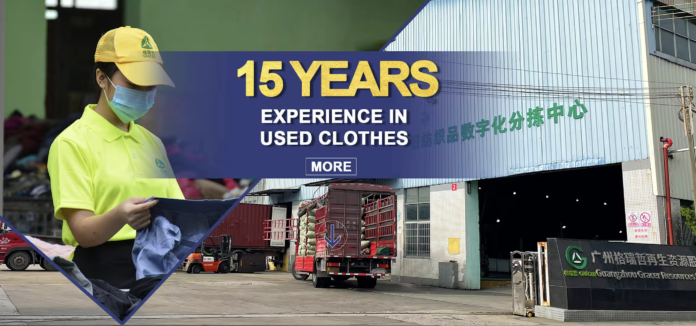
Walking through the streets of Africa, one will often spot striking Chinese phrases on clothing. A young man selling goods on the side wears a blue T-shirt with the phrase, “Order takeout, go to Ele.me” on the back, while a girl on a bicycle sports a light yellow shirt that says, “Cross Shenzhen,” and black pants with “Run, Brothers.” These bold Chinese characters are not local designs—they’re second-hand clothes from China that have made their way across the ocean.
Every year, millions of tons of discarded clothes flood Africa’s market, supporting a business worth billions. In 2023, global second-hand clothing sales hit $211 billion, growing by 19% from the previous year. By 2024, Africa’s clothing market alone reached $70.58 billion, growing at a rate of 5.16% annually.
This booming market has attracted many Chinese entrepreneurs. In 2010, Guo Song, a college student, began collecting discarded military training uniforms from classmates and reselling them to training centers. This side hustle ignited his interest in the second-hand clothing business.
In 2016, Guo Song and his team founded Gracer in Guangzhou. They use big data and logistics networks to collect, sort, and package domestic textiles, then export them to Africa, Southeast Asia, and beyond. Gracer processes tens of thousands of tons of second-hand clothing each year, with over 60% of its exports going to Africa. In 2023, the company’s transactions exceeded $55.31 million.
Africa has become the world’s largest market for second-hand clothing. In Kenya, for example, Nairobi’s bustling second-hand market is a central hub, with clothes passing through daily. In 2021, China became the largest exporter of second-hand clothing to Africa, accounting for over 40% of Kenya’s imports. With new clothes often out of reach for most African consumers, second-hand items have become a staple. In countries like Uganda and Tanzania, second-hand clothing not only meets basic needs but provides jobs and sustains local economies.
Despite opposition from some governments, which argue that second-hand imports harm local industries, the demand for affordable clothes is undeniable. In economically struggling regions, second-hand clothes are a lifeline. Guo Song notes that the market will persist as long as there’s demand—until people can afford new clothes, second-hand items will always be necessary.
But doing business in Africa isn’t without its challenges. Guo Song faced resistance when he expanded Gracer into Uganda, where local dealers felt threatened by foreign competition. Despite initial setbacks, including issues with customs and local collaboration, Guo Song’s team managed to scale to a monthly revenue of $1.38 million within six months. Yet, after three years, the Uganda operation collapsed, prompting a return to China.
The complexities of managing staff and operations abroad, combined with the lack of a compliant business environment, made it clear to Guo Song that while the product could thrive in Africa, building a sustainable operation there was far more difficult. In the end, he focused on refining the domestic supply chain to improve product quality and streamline logistics.
Now, Gracer has established a robust recycling and processing network across China, handling over 200 varieties of clothing in 245 cities. Guo Song remains committed to eventually re-entering Africa, once the company’s domestic operations are fully digitized. After all, a successful overseas venture requires deep local engagement—something he still plans to pursue.
Source: Gracer



